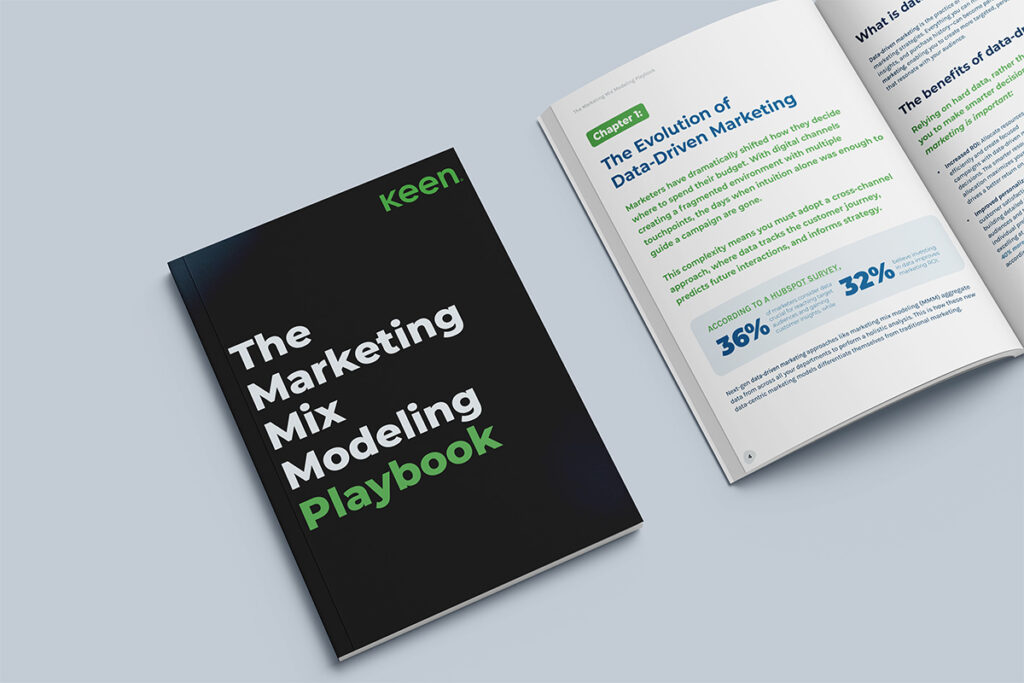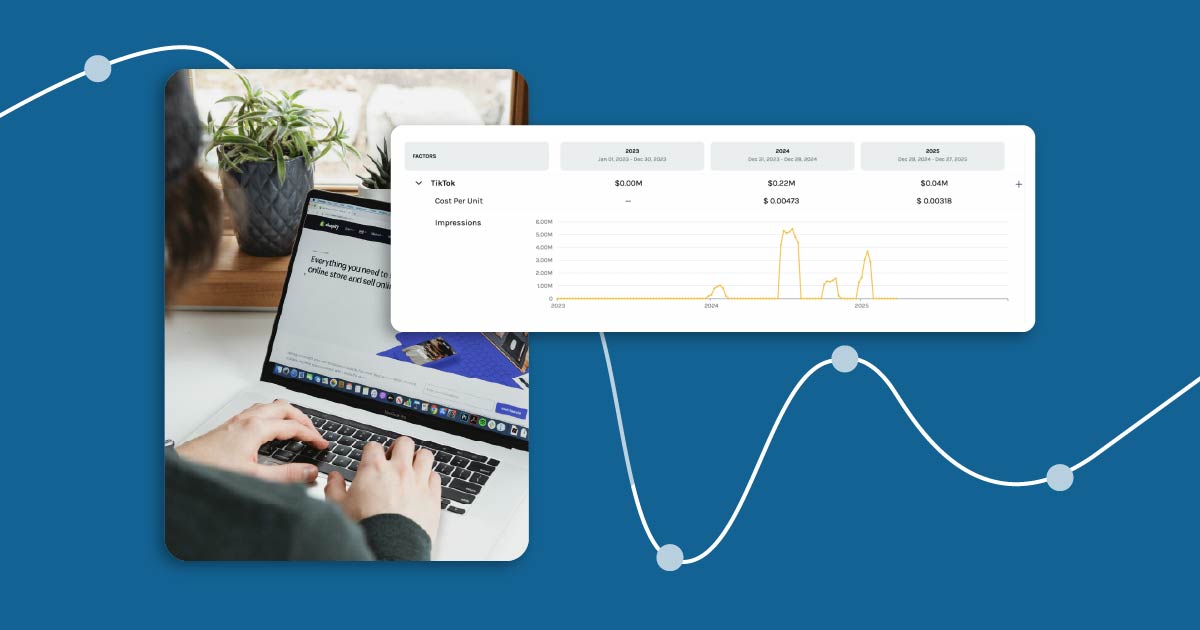There’s no shortage of vendors promising to measure marketing performance, but when it comes to choosing a marketing mix modeling (MMM) partner, the differences matter. Some platforms focus purely on digital. Others rely on slow, service-heavy delivery.
Only a few are built for marketers who need fast, reliable planning support across the entire funnel.
If you’re evaluating the top marketing mix modeling companies, start with the comparison table below for a quick overview, then dig into the vendor-by-vendor breakdown to find the best fit for your team.
| Marketing mix modeling solution | Best for | Self-serve access | Offline media support |
| Keen | B2C/B2B, multi-channel and cross-channel media planning | Yes | Yes |
| Fospha | Ecommerce, paid social optimization | Yes | No |
| ScanmarQED | Enterprises with in-house analysts | Yes (analyst-led) | Yes |
| Rockerbox | DTC brands | Yes | No |
| Recast | Growth teams, always-on modeling | Yes | No |
| Measured | Retail/ecommerce brands | Partial | No |
| Nielsen | Enterprise brands with large offline budgets | No | Yes |
| Neustar | Brands needing ID-level and MMM integration | No | Yes |
| Analytic Partners | CPG, pharma, global enterprise complexity | No | Yes |
| Ipsos MMA | Strategy-led planning and ROI measurement | No | Yes |
| Gain Theory (WPP) | Multi-market, custom modeling needs | No | Yes |
| Deloitte/Accenture/BCG | Bespoke MMM via transformation projects | No | Yes |
| Robyn (Meta) | In-house data science teams | No (code-only) | Yes (with configuration) |
| Meridian (Google) | In-house teams with engineering resources | No (code-only) | Yes (with configuration) |
Best tech-enabled marketing mix modeling tools
Tech-enabled MMM platforms prioritize fast marketing mix modeling insights, continuous model updates, and planning features that you can use without relying on data science teams.
1. Keen
Keen’s AI-powered MMM platform is built for speed, flexibility, and planning. It combines MMM with machine learning and forward-looking budget simulation, providing always-on insights and clear visibility into what drives performance.
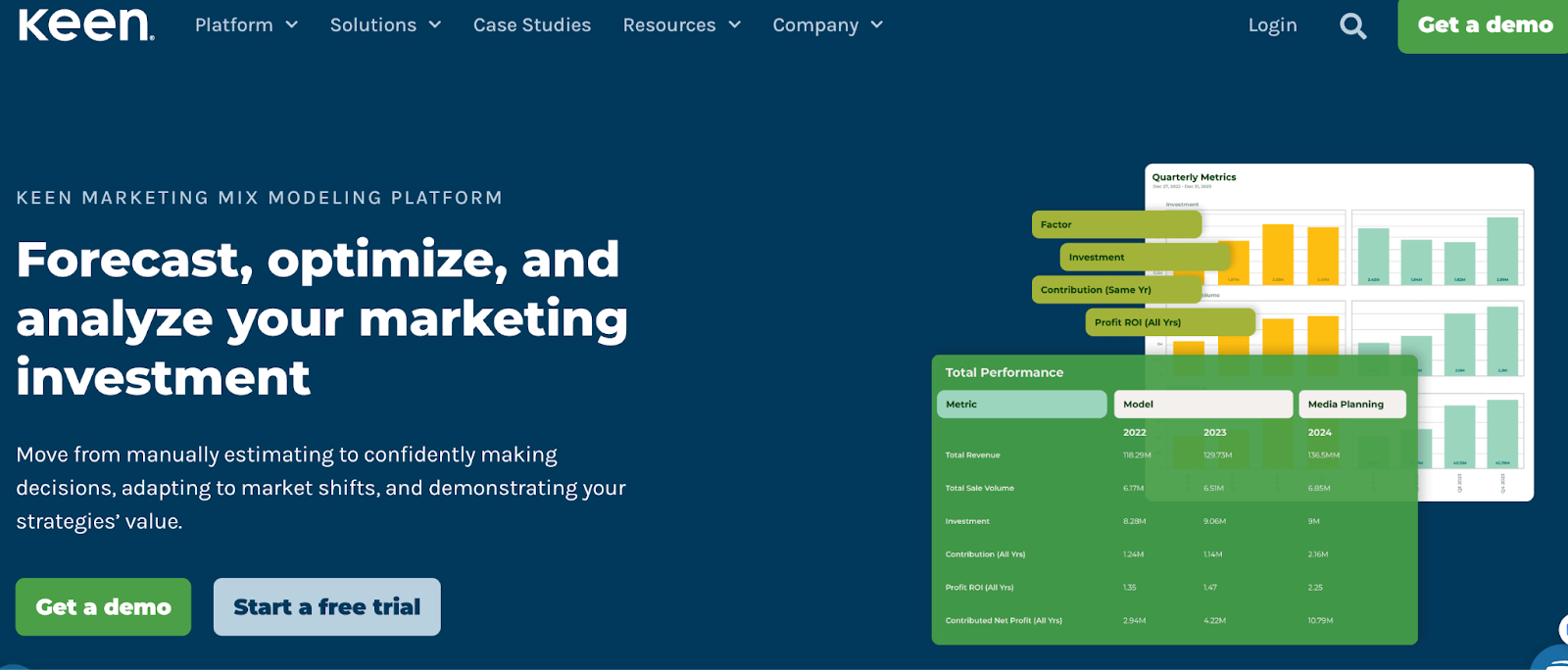
Best for: B2C and B2B brands managing multi-channel budgets, including digital, traditional, and brand spend, with a need for fast, ongoing decision support
Setup time: Typically 2-3 weeks, depending on data readiness
Pros
- Real-time scenario planning and elasticity forecasts
- Built-in budget planning tied to financial outcomes
- AI-powered modeling with clear transparency into drivers
- Interoperable and scalable system architecture
- Automated model calibration and refresh cycles
- Insightful outputs, even with limited historical data
Cons
- Platform-led design, prioritizing speed and usability over full-service consulting
- Standardized modeling optimized for scalability, not built for teams needing to construct econometric models entirely from scratch
2. Fospha
Fospha is a measurement platform focused on incrementality and media mix modeling for digital-first brands. It emphasizes paid social and performance marketing insights, especially in environments where platform-reported ROAS is unreliable.
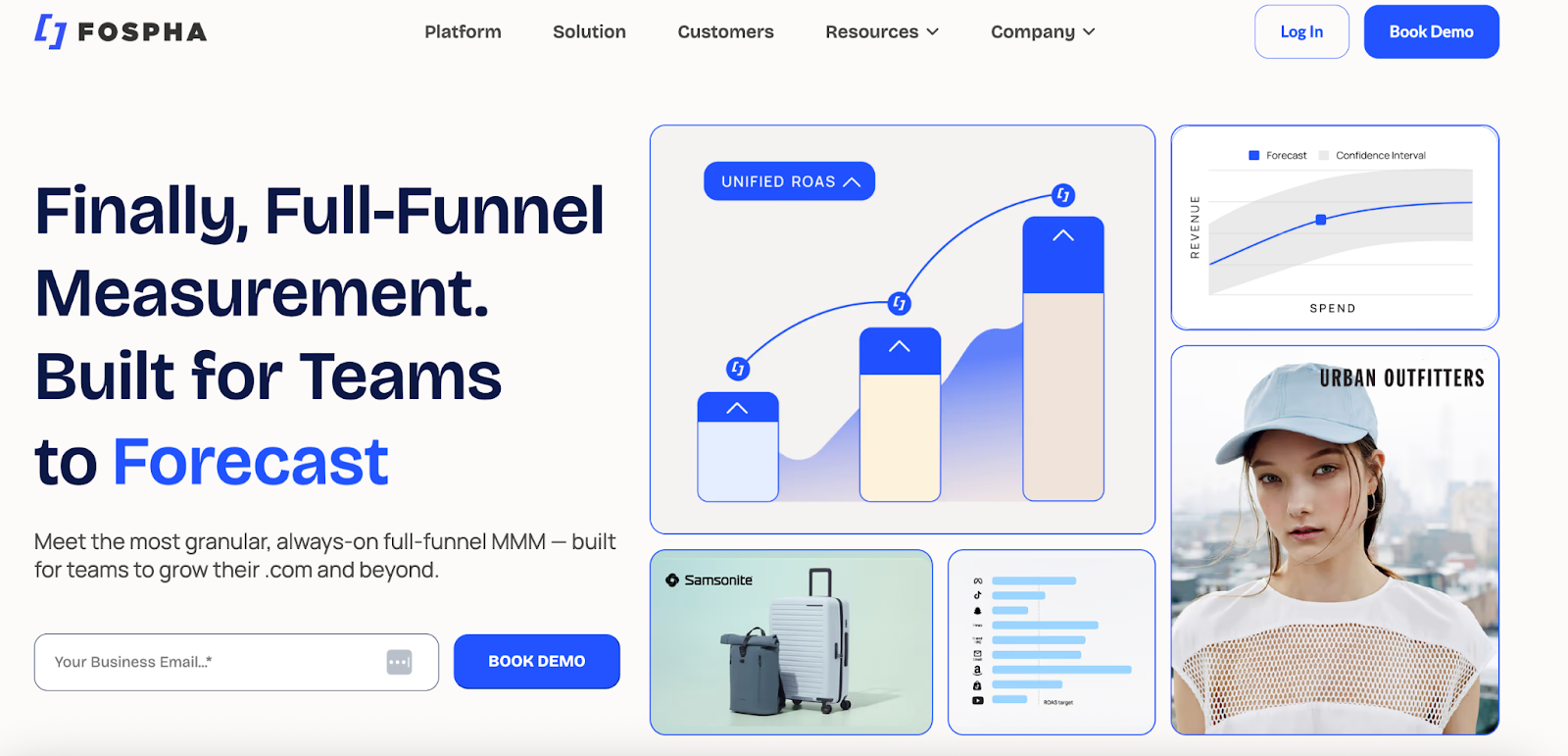
Best for: Ecommerce and DTC brands with a marketing mix including heavy Meta, TikTok, and Google Ads spend
Setup time: Roughly 2-3 weeks, assuming clean ad platform integrations
Pros
- Digital-platform-focused approach with emphasis on paid social and performance media
- Integrated incrementality testing
- Direct integrations to ad platforms
Cons
- Limited support for offline, brand, or upper-funnel channels
- More focused on channel-level optimization than strategic forecasting
- Less transparent than full MMM platforms in terms of methodology
- Unsuitable for complex media mixes or enterprise-level planning
3. ScanmarQED
ScanmarQED offers marketing mix modeling, budget planning, and data visualization. It’s primarily used by teams with in-house analytics expertise who need direct access to model inputs, assumptions, and outputs.
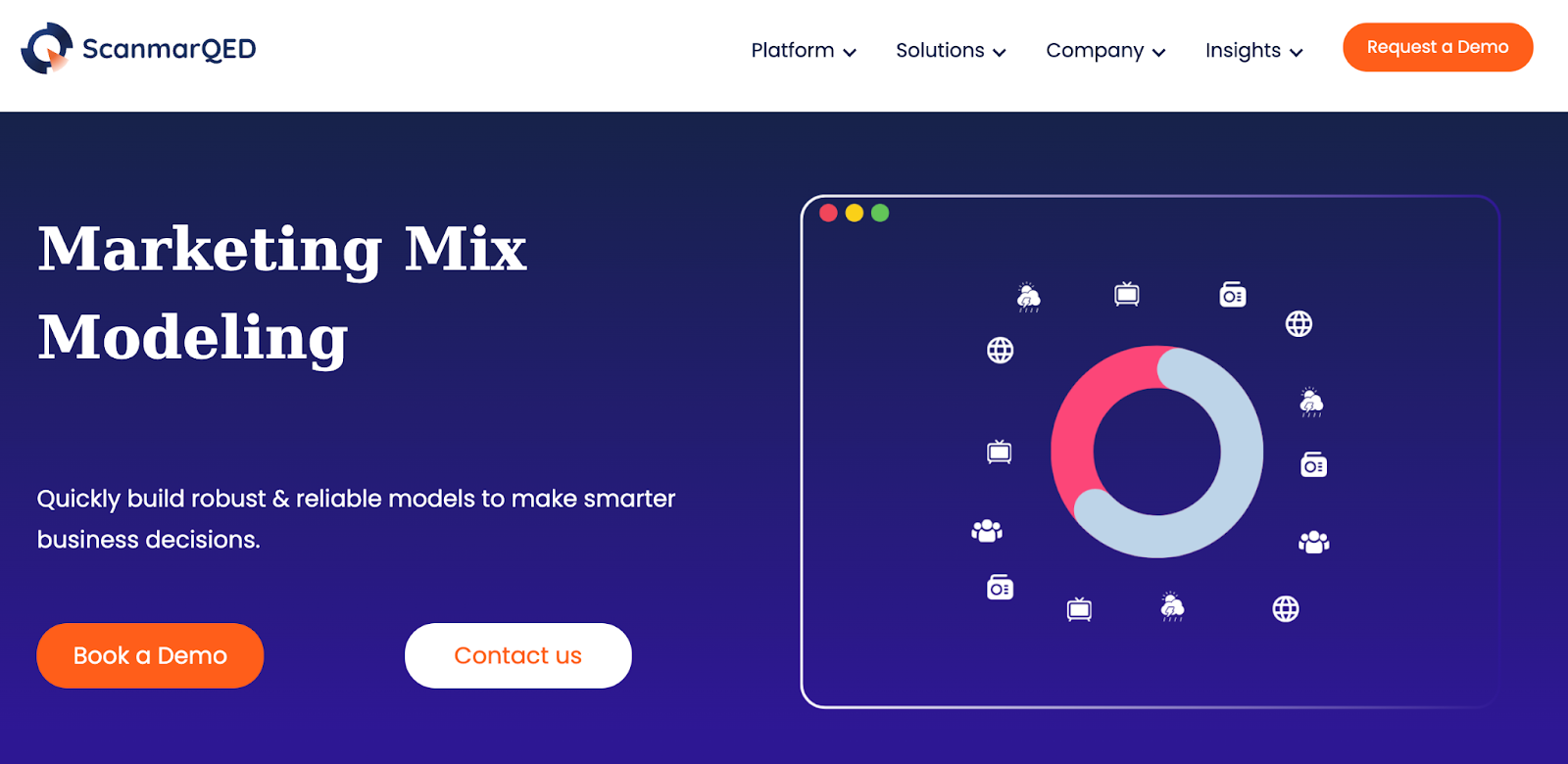
Best for: Large enterprises with in-house analytics teams that want granular modeling control across geographies, brands, or product lines
Setup time: Varies based on complexity; typically 4-8 weeks
Pros
- Customizable modeling and planning environment
- Compatible with complex data structures and business hierarchies
- Forecasting and budget allocation tools
Cons
- Steeper learning curve, not built for marketing end-users
- Resource-intensive, requiring internal modeling expertise or heavy support
- Limited emphasis on automation or AI-driven recommendations
- Slower time-to-insight compared to lighter MMM platforms
4. Rockerbox
Rockerbox provides unified measurement across media attribution and MMM, integrating directly with platforms like Shopify, Meta, and Google Ads.
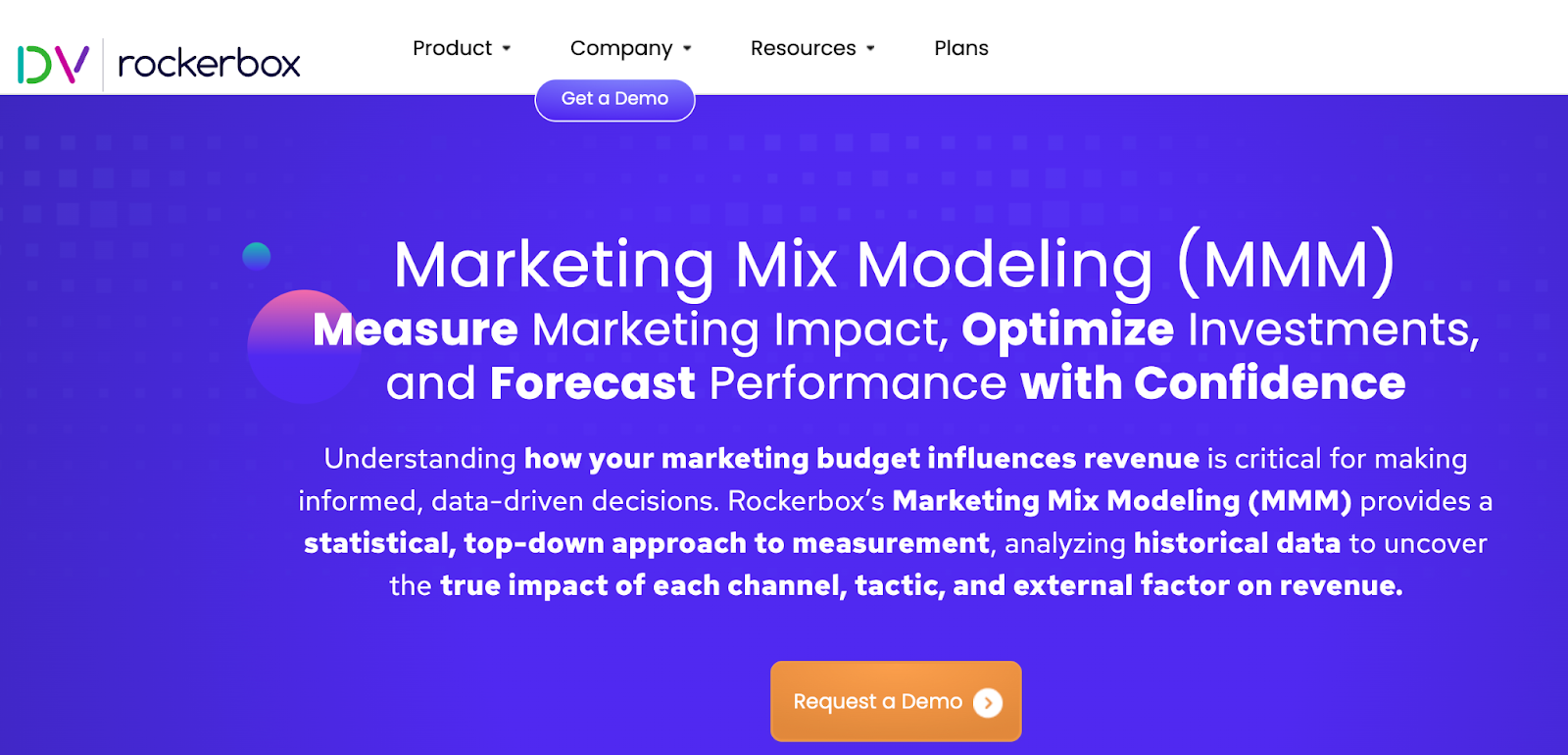
Best for: DTC and ecommerce brands
Setup time: Typically 2-3 weeks with standard integrations
Pros
- Integrations with ecommerce and ad platforms
- Combined MMM and attribution in a single dashboard
Cons
- Limited support for offline, upper-funnel, or brand channels
- Incapable of advanced forecasting or scenario planning
- Less flexible than traditional MMM tools for complex business models
- Focused on digital performance, not full-funnel optimization and planning
5. Recast
Recast is a MMM platform that uses a Bayesian statistical model. It’s built for teams that are focused primarily on digital performance channels.
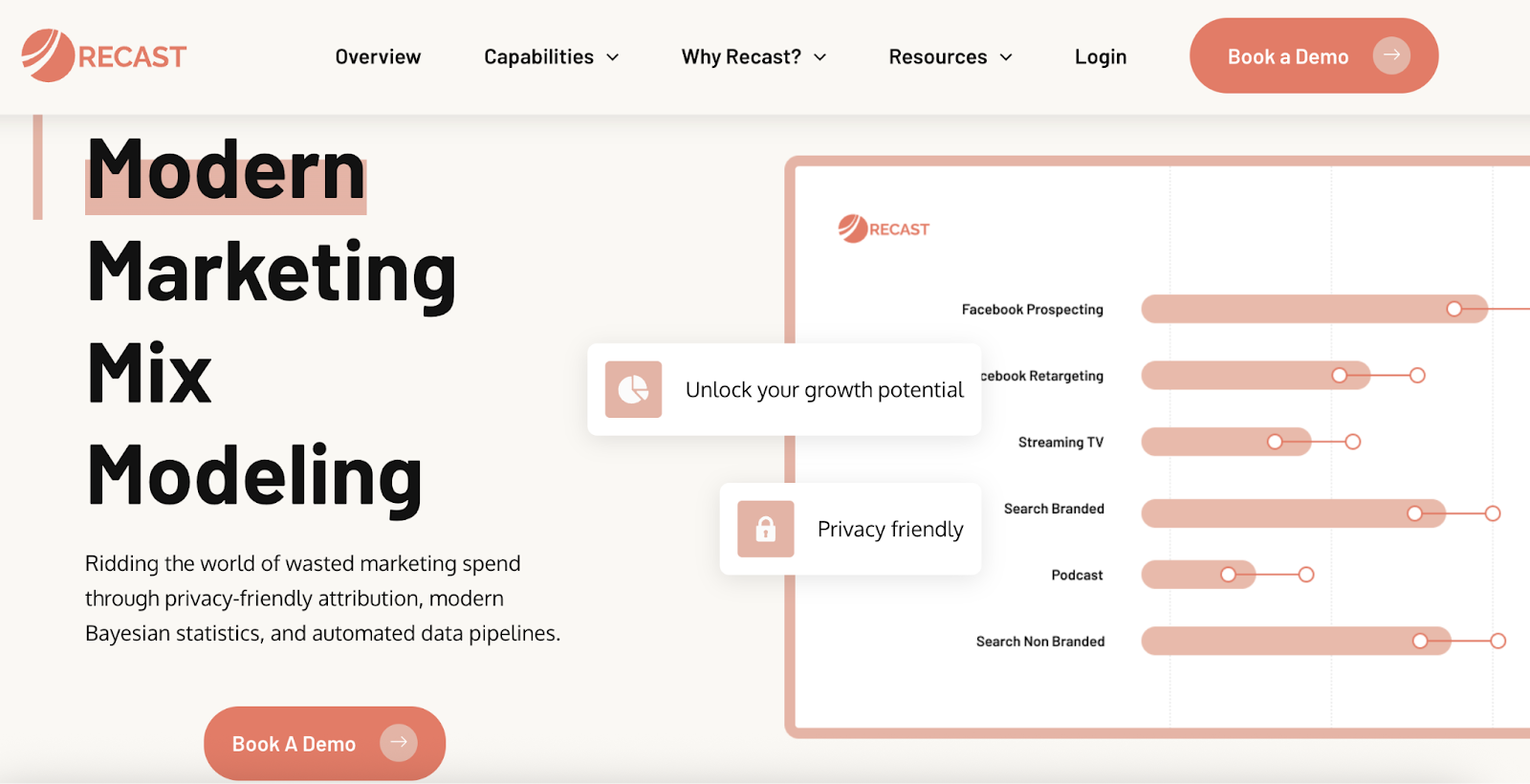
Best for: Digitally native brands
Setup time: 2-4 weeks with ongoing automated updates after initial integration
Pros
- Continuously updated model with automated data ingestion
- Simple interface built with marketers in mind
Cons
- Focused primarily on digital channels; limited support for offline media
- Less flexible for large enterprises with complex media hierarchies
- Incapable of integrated budget planning or scenario forecasting
- Statistically demanding, requiring some knowledge to interpret outputs effectively
6. Measured
Measured offers a hybrid approach to marketing measurement, combining MMM, incrementality testing, and attribution insights.
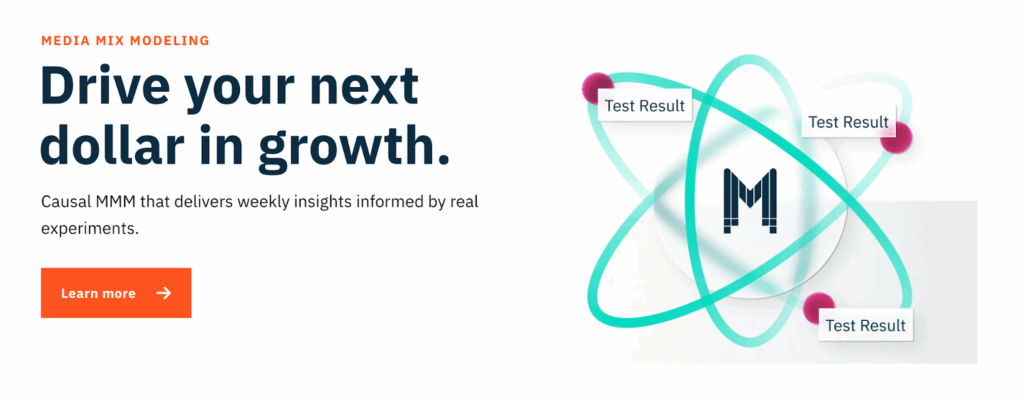
Best for: Retail and ecommerce brands with large paid media budgets
Setup time: Typically 3-6 weeks
Pros
- Integrated MMM, incrementality, and attribution insights
- Transparent methodology with customizable reports
- Setup that does not require in-house data science
Cons
- Limited support for media spend, offline channels, or upper-funnel channels
- Not built for scenario planning or forward-looking forecasting
- Heavier focus on channel optimization than strategic budgeting
- Black-box–like experience if deeper model access is needed
Consulting-driven or custom MMM vendors
Consulting-led MMM companies focus on customized models, strategic insights, and hands-on delivery. These vendors are best suited for large organizations that need bespoke analysis, offline media expertise, and executive-level reporting, even if it comes at the cost of speed or flexibility.
7. Nielsen
Nielsen is a long-standing traditional MMM provider, with experience in offline media measurement and large-scale enterprise accounts. It supports traditional, digital, and syndicated media evaluation, typically through service-led engagements with longer timelines.

Best for: Global enterprises with large offline media investments and dedicated analytics teams
Setup time: Typically 8-12+ weeks
Pros
- Support for offline, linear TV, and traditional media
- Track record with large, regulated, or finance-led organizations
- Trusted by finance and executive teams
Cons
- Slow delivery cycles; not suited for agile or iterative marketing
- Data-intensive setup requiring extensive historical inputs and close collaboration
- Service-heavy model with limited control or visibility
- Expensive compared to newer, platform-based MMM solutions
- Poor fit for digital-first or mid-market brands
8. Neustar (TransUnion)
Neustar, now part of TransUnion, offers marketing mix modeling as part of a broader identity and measurement platform. Its MMM capabilities are integrated with audience insights, attribution, and customer segmentation.
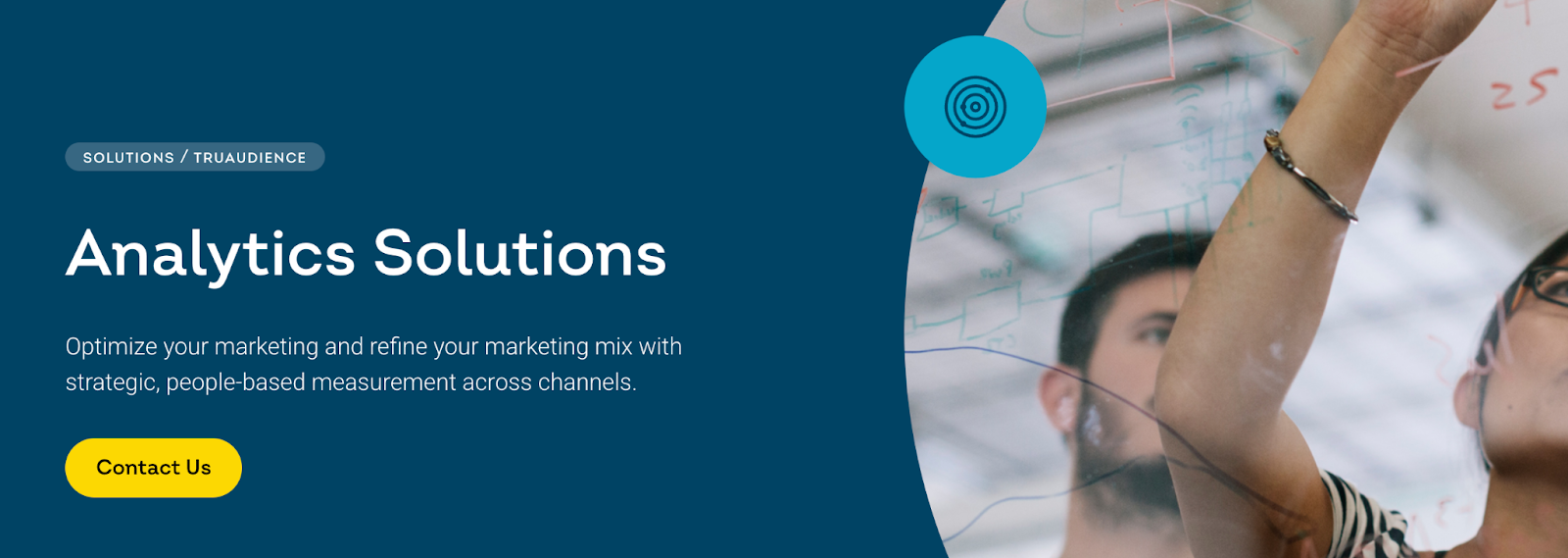
Best for: Brands in telecom, financial services, and retail
Setup time: Typically 8-10 weeks
Pros
- Audience segmentation and data enrichment capabilities
- Omnichannel marketing support, including offline and digital
- Backed by TransUnion’s data and infrastructure
Cons
- Lengthy onboarding and data integration timeline
- Overly complex for teams focused only on MMM
- Rigid platform for marketers needing flexible scenario modeling
- Service-heavy model, limiting speed and self-serve planning
9. Analytic Partners
Analytic Partners is a global analytics consultancy offering commercial mix modeling, with MMM as one component of its broader decision support system. Its platform, GPS-Enterprise, is designed to measure marketing mix variables.
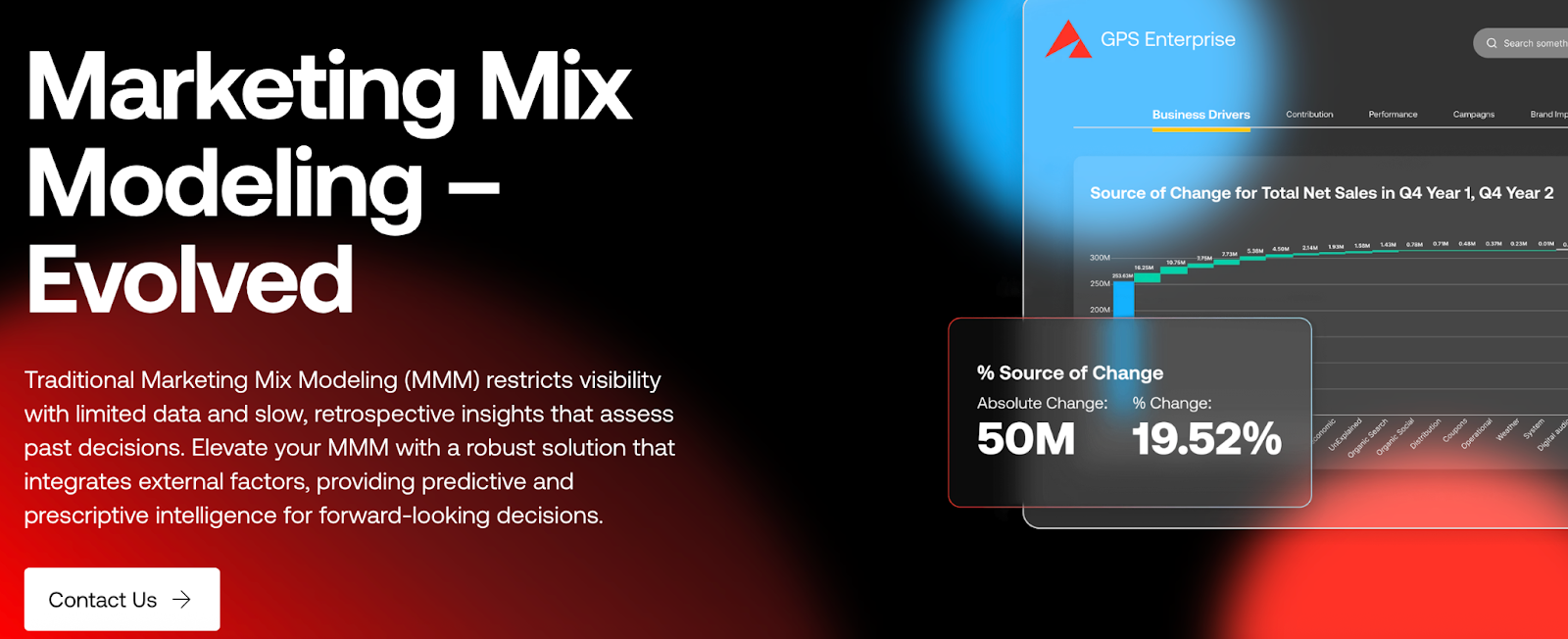
Best for: Large organizations that need enterprise-grade modeling across media, pricing, distribution, and macro drivers
Setup time: Typically 10-14+ weeks
Pros
- Strategic, insight-rich presentations tailored for executive decisions
- Experienced in handling multi-region and multi-brand complexity
- Hybrid approach that blends platform outputs with analyst guidance
Cons
- Slow lead times and refresh cycles
- Collaborative process requiring close coordination with analysts
- Expensive and not designed for self-serve MMM
- Better suited for annual marketing planning than real-time optimization
10. Ipsos MMA
Ipsos MMA (Marketing Management Analytics) provides full-service marketing mix modeling, leaning on econometrics and consulting, often supporting executive-level planning and ROI accountability.
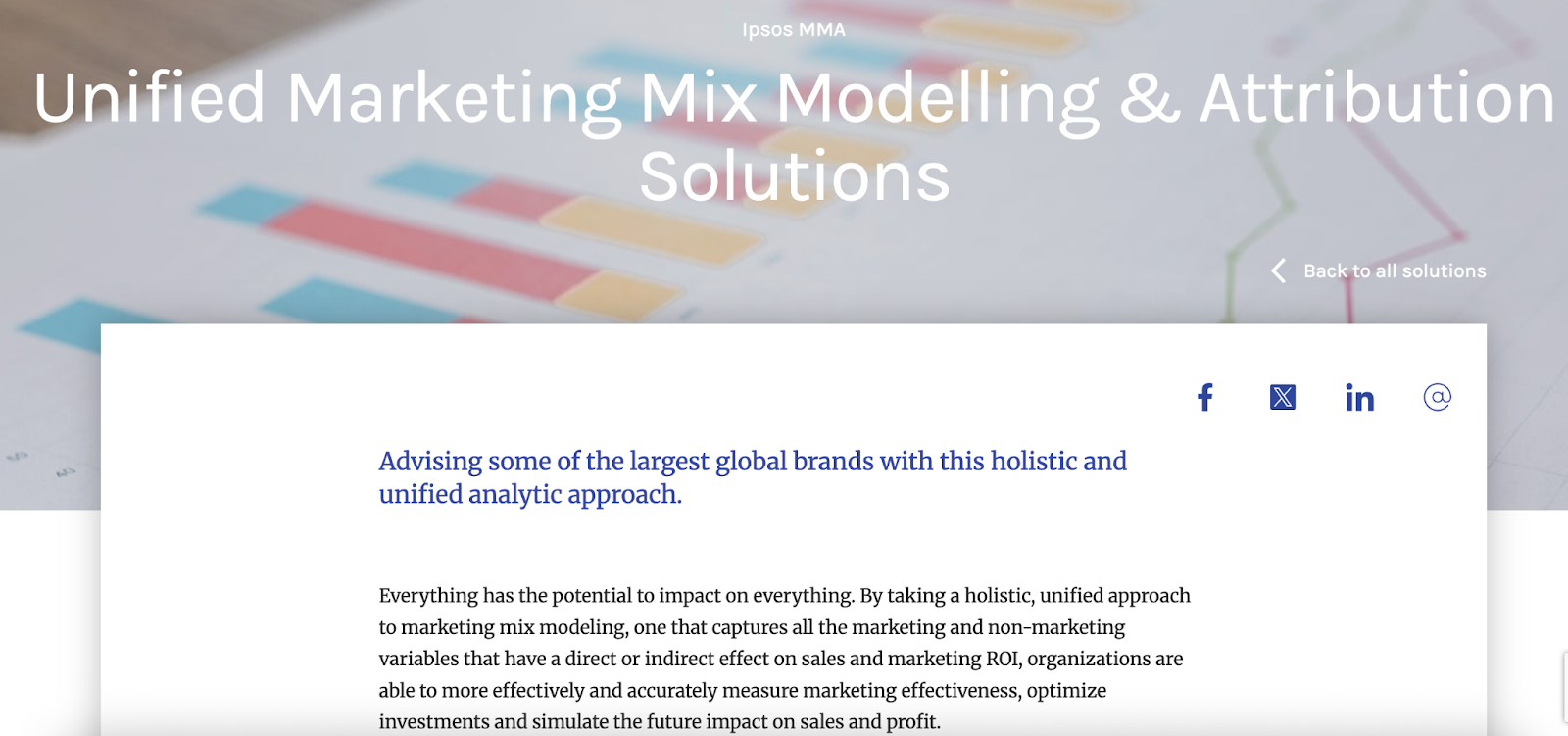
Best for: Enterprises with complex media portfolios
Setup time: Typically 10-16 weeks
Pros
- Modeling tailored to each business
- Support for traditional, digital, and trade media
- Consultant-led delivery with strategic interpretation and presentation
Cons
- Slow setup and refresh timelines; not ideal for agile marketing teams
- Service-heavy model with little platform interactivity
- Expensive engagement with long-term commitments
- Inflexible for marketers needing weekly or monthly optimization
11. Gain Theory (WPP)
Gain Theory is the analytics consultancy within WPP, offering custom-built marketing mix models and broader performance measurement solutions.

Best for: Global brands with complex multi-region campaigns
Setup time: Typically 12+ weeks
Pros
- Experienced in CPG, automotive, and enterprise-scale media
- Integrated use of brand tracking, econometrics, and marketing KPIs
- Presentations aligned with senior leadership and finance needs
Cons
- Consultant-dependent model with no self-serve platform
- Long timelines and high costs
- Unsuitable for fast-turn or continuous planning
- Limited transparency or flexibility for marketing teams needing hands-on access
12. Deloitte / Accenture / BCG Gamma
These global consulting firms offer marketing mix modeling as part of broader data science and digital transformation services. Rather than providing an off-the-shelf product, they build custom econometric models aligned to a client’s specific strategy, business structure, and internal systems.
Best for: Enterprises undergoing large-scale marketing transformation
Setup time: 12-20+ weeks
Pros
- Customizable across media, pricing, operations, and business outcomes
- Stakeholder-focused approach to change management and enablement
- Resourced with large data science teams and industry-specific expertise
Cons
- Rigid approach for marketers—everything is consultant-delivered
- Long, expensive engagements, often tied to broader projects
- Slow turnaround and low flexibility for ongoing media changes
Open-source MMM solutions
Open-source MMM solutions require significant technical resources to build, deploy, and maintain. These options are best for organizations with dedicated data science teams that want to own the entire modeling process end-to-end.
13. Robyn (Meta)
Robyn is Meta’s open-source marketing mix modeling library, built to help in-house data science teams run automated, Bayesian MMM. It’s flexible, customizable, and designed to scale, but it’s also code-only and not marketer-friendly out of the box.

Best for: Organizations with strong internal data science capabilities
Setup time: Varies widely, typically several weeks to months, depending on team bandwidth
Pros
- Free and open-source with active community support
- Automated hyperparameter tuning and model selection
- Full control over model behavior
- Multi-channel design suited for high-frequency digital data
Cons
- Platform-affiliated, developed by Meta, raising concerns about neutrality and long-term incentives
- Code-based, requiring Python and modeling expertise
- Interface-free, with no UI or accessible platform layer
- Planning-limited, lacking built-in forecasting or scenario tools
14. Meridian (Google)
Meridian is Google’s open-source marketing mix modeling framework, designed to measure media effectiveness. Like Meta’s Robyn, it’s aimed at data science teams who want to build and control their own MMM workflow.
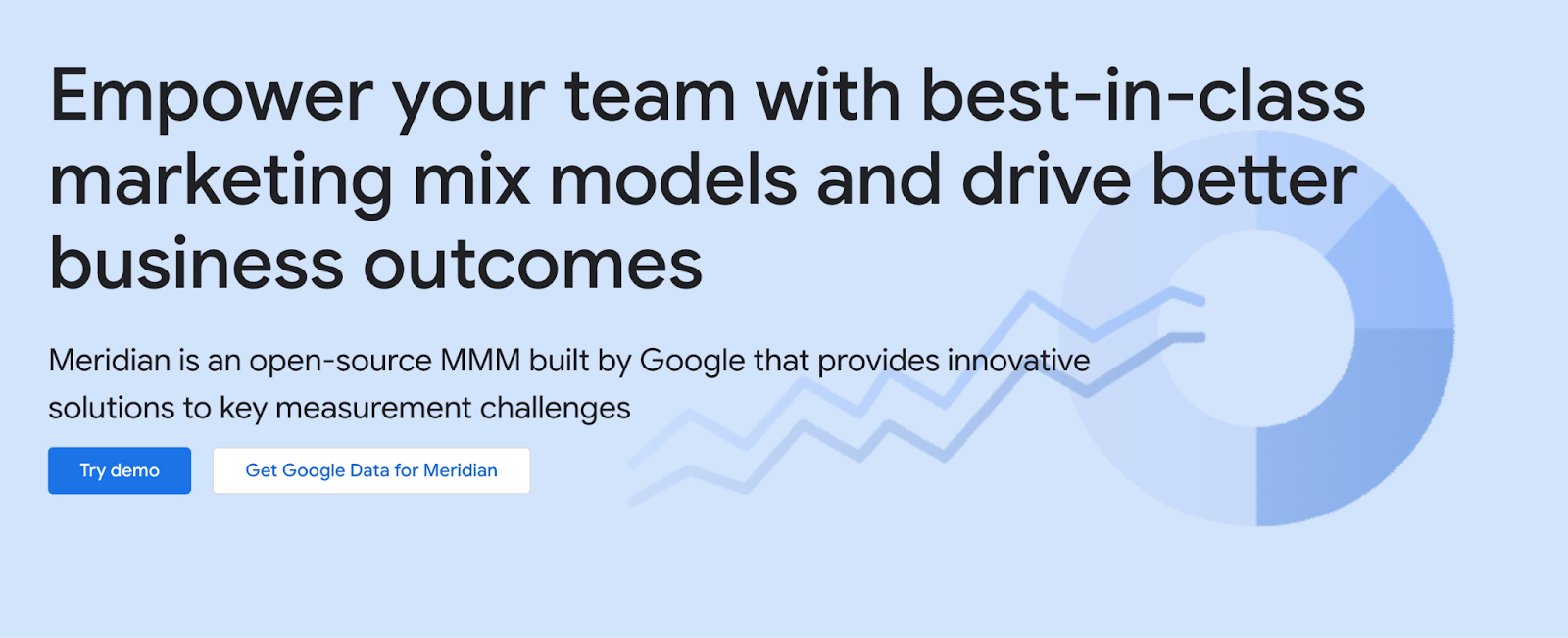
Best for: Technical teams at large brands or agencies who want to develop in-house MMM capabilities
Setup time: Varies widely. Typically several weeks to months, depending on internal resources
Pros
- Free and open-source with detailed documentation
- Support for weekly or daily data and media hierarchies
- Media saturation modeling, adstock curves, and priors
Cons
- Resource-intensive, requiring data science and engineering support
- Unusable by marketers or analysts without coding skills
- Lack of forecasting, planning, or scenario tools
How to choose the best marketing mix modeling solution
A study by eMarketer and Snap Inc. found that 61.4% of US marketers spending $500K+ annually on digital advertising want faster, more effective media mix modeling. This data reflects what many teams are feeling: traditional MMM is too slow, too rigid, or too disconnected from actual planning.
Choosing the right solution means looking beyond surface features and evaluating whether it fits your media mix, your planning frequency, and your team’s day-to-day needs. These six factors matter most when selecting your MMM solution:
- Model accuracy and transparency: You need an MMM model you can trust, and one you can defend in the boardroom. Look for platforms that clearly show how each input drives results, not just a black box that spits out numbers.
- Frequency and speed of model updates: Marketing decisions happen on the move. If your MMM vendor delivers results once a quarter, you will always be behind and playing catch-up.
- Support for forecasting and scenario planning: MMM should not stop at marketing measurement if you want to tie the insights to your business goals.
- Marketing channel mix and tactic coverage: Make sure you’re able to model tactics like branded search, upper-funnel display, or in-store promotions with enough granularity to make smart tradeoffs.
- Compatibility with your marketing tech stack: Make sure the platform integrates with your existing tools, including CRM, ad platforms, sales systems, and offline data.
- Flexibility to model: Some platforms only support out-of-the-box models. That might be fine for simple use cases, but if you have unique sales cycles, regional differences, or multi-brand complexity, you need a solution that adapts to your business, not the other way around.
Why top marketers are choosing Keen’s MMM platform
Unlike traditional MMM solutions that rely on quarterly reports and black-box models, Keen’s AI-powered platform gives you real-time scenario planning, elasticity-based forecasts, and clear visibility into what drives performance.
With our platform and patent-pending Marketing Elasticity Engine (MEE), you can:
- Model media tradeoffs instantly
- Simulate budget shifts across brand and performance spend
- Forecast demand and margin impact before campaigns launch
- Refresh your media plans as needed
Request a demo to see why Keen is one of the best MMM solutions on the market.

